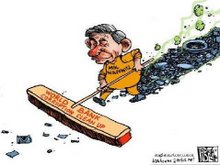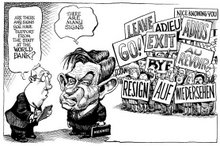Scandal threatens World Bank's role
Financial Times
Krishna Guha and Eoin Callan in Washington
April 23 2007
The independent agency charged with assessing the effectiveness of the World Bank has issued a searing indictment of Paul Wolfo-witz's leadership, warning that the situation at the bank risks causing "irreparable harm to worldwide efforts in poverty reduction and sustainable development".
In a formal statement seen by the Financial Times, which the bank's board will consider this week, the Independent Evaluation Group called for "swift changesin management and aconcerted effort to restore credibility".
Click here for full story
See Comments for IEG Statement



2 comments:
Financial Times
Text of IEG statement
April 22 2007
Memo
Current Events and the World BankGroup’s Development Effectiveness
Statement of the Director-General, Evaluation
To The Board of Executive Directors
April 20, 2007
IEG welcomes this opportunity to address the World Bank Group’s development effectiveness as the Board considers the current crisis in leadership. The institution is at a critical juncture where its development effectiveness is being jeopardized by serious governance problems that have recently come to light. A proper and quick resolution of this problem is vital for the organization’s continued effectiveness in development.
The WBG’s fundamentals remain strong. IEG evaluations find that past performance of projects the WBG finances has been strong and improving. Moreover, the Group’s support for country programs helps to improve effectiveness in the use of financing from all sources. The WBG is well-positioned, in partnership with other multi-laterals, bi-laterals and the private sector, to help get results from the financial flows for development. Clients value the Group’s impartial and professional advice.
Recent IEG and other evaluations point to criteria for assessing the governance of programs and public organizations, which include accountability, transparency, and probity. The recent chain of events raises concerns in these respects. Indications are that the ability of staff -- particularly those working in client countries -- to carry out daily interactions with clients, as well as the institution’s ability in convening partners, are eroding. Trust is being damaged.
This breakdown seems to have occurred because of three inter-related aspects below: • An increasing lack of transparency in the application of Bank’s development policies, for example, in population, climate change, governance and anti-corruption.
• Serious breaches of internal HR policies in certain instances, which creates double-standards and also impairs the Bank’s ability to engage with clients on governance issues.
• Parallel lines of authority and bypassing of lines, leaving clients and staff confused and demoralized.
Unless confronted immediately, the current problems can impair the institution’s knowledge base and begin to affect its financial base, particularly making it more difficult to mobilize vital IDA funds. Further damage to one of the premier development institutions can cause irreversible harm to worldwide efforts in poverty reduction and sustainable development.
Looking forward, it may become difficult to retain and attract staff. The WBG is in a unique position to provide voice, leadership and support for global development. To continue to deliver on that promise, the institution must build on its strengths, and apply the principles of good governance. That is why there must be swift changes in Management and a concerted effort to restore credibility. It is also time to assess critically the governance structure for the WBG and take steps to strengthen it.
Copyright The Financial Times Limited 2007
Excellent... I am moved by the courage of those who have spent the time and energy to prepare this very statement. Well done! I trust that they are ready to do more and will not give up under the circumstances.
Post a Comment